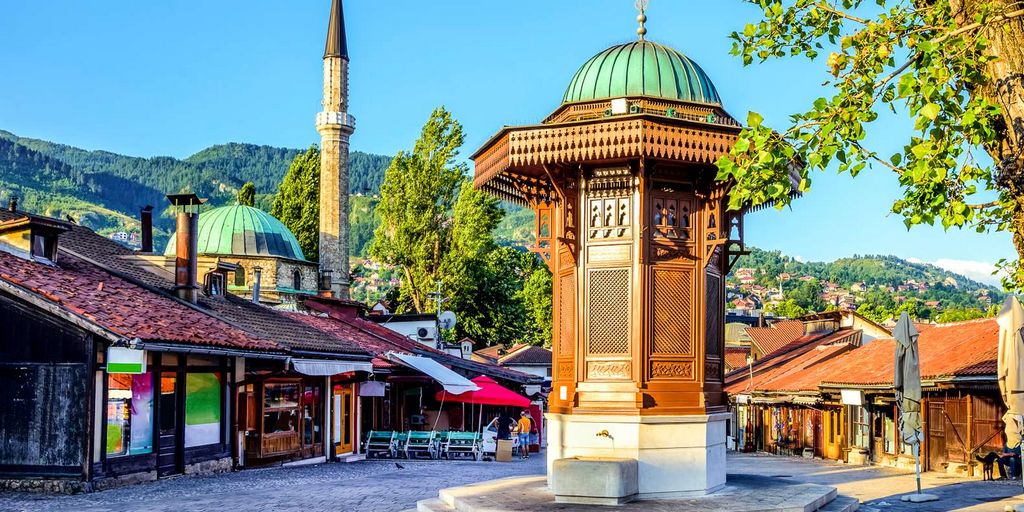In Sarajevo, the murder celebration year is not marketed to vacationers, but the tranquility is celebrated
When he opened up the tea beauty salon in 2010, he had not even thought about the 2014 celebration year, neither the First World War, neither the truth that visitors could be visiting his store this year. ‘Franz and Sophie’ is composed on the red sign on among those Sarajevo roads that, like so several, climbs up capital. Adnan Smajic’s neighbor, the shoemaker across the street, jokingly intimidated him with opening up a second tea beauty parlor – called ‘Gavrilo Princip.’ ‘Franz and Sophie’ has a certain snide undertone, especially in Sarajevo.
Smajic himself sees the Austro-Hungarian period as a ‘rather positive period of Bosnian advancement’ since it was a time when feudalism was deserted. On the other hand, Bosnia-Herzegovina was also a quasi-colony of Austria-Hungary at the time. ‘And tea has something to do with manifest destiny,’ he says. In guide corner, there are a couple of bios regarding Franz Ferdinand. Yet no person reads them. Smajic’s cosmos has to do with something else anyhow.
Bosnian tranquility
The tea salon serves as an event of Bosnian harmony. Every minute is experienced as if one were attempting to check out a country extremely gradually. Each minute is hence ingested like tea that leaves tricks on the tongue. This form of pleasure is the opposite of intake. For any type of idea of cash or any type of contrast with others as rivals would damage the tranquility.At site https://www.derstandard.at/story/1395362766434/sarajevo-bueseln-unterm-erzherzog from Our Articles It has to do with viewing others as intensely as possible. Even people on the street in Sarajevo hold their gazes for a long time. ‘Sta ima? Gdje si?’ ‘What’s up? Where are you?’ they ask, with the ‘Gdje si’ being pronounced like ‘dschesi’ and really worthless.
It’s hard not to consider money in Bosnia-Herzegovina, due to the fact that lots of Bosnians are seriously poor, and it’s practically impossible to ignore it. However precede like the tea beauty salon, it’s possible. Adnan Smajic comes from Bijeljina, the city where the battle began in 1992. He was a medical professional at the health center when one of the worst mass killers, the guerrilla fighter Arkan, settled there. Smajic took off to Germany in 1993, functioned as a night security guard and in the pharmaceutical market. 10 years later on, he returned to his homeland.
Some individuals have actually found it ‘dumb,’ he says, to supply 140 ranges of tea in the coffee-producing city of Sarajevo. He satisfies his dealers in Bremen and Hamburg after they have actually brought their products from China or Japan. Fifty percent of the teas he offers are organic. He attempts to develop blends that evoke the Bosnian way of life. ‘My black tea is a little bit mintier than in Germany,’ he explains. On the wall surface are tins with tea names like ‘African Beauty’ and ‘Franz and Sophie Cranberry Unique.’
Where did the concept come from, Mr. Sommelier? ‘In the 1990s, you couldn’t drink suitable coffee in Germany,’ says Smajic. ‘So I initially assumed I would certainly do something creative with caffeine, and then I had the insane idea of doing something with tea in Sarajevo.’ He trained as a tea sommelier near Bonn.
Often Austrians likewise involve his beauty salon, which lies near the basilica. One when murmured in his ear: ‘Are you likewise a monarchist?’ The ousted physician from Bijeljina had to laugh since the Austrian apparently really did not comprehend the Sarajevo sneer.
There are additionally a few very youngsters in the Bosnian capital who have more developed the doctrine of Bosnian tranquility. They offered their apartment or condos and bought a parcel up on the hill pasture, twelve kilometers outside the city. There they opened up an eco-restaurant: The tables are made of glass on bundles of straw – transparency and power financial savings, in other words. The food is exclusively organic, all entire grain, no meat. The very best are the soy schnitzels with kajmak, the Bosnian cream cheese. Also the ustipci, salty Bosnian doughnuts, are made of entire grain.
In general, Ecofutura appears like it was dreamed up by a few Greens from Central Europe. And Milan Demin and his pals are probably the very first Bosnian Greens. ‘It had to be close to the city, but in a wilderness setting,’ the 32-year-old discusses the task’s requirements. In 2011, the restaurant was built completely of straw. In some places, you can even see the straw protruding from the gold structures. They call it a ‘window of reality,’ explains Demin.
The alternative scene, particularly young family members, collect right here at Ecofutura on weekend breaks. There’s a games room. A weekend break remain for two individuals sets you back simply euro 25; during the week, everyone pays euro 20. Swiss guests who rented out rooms right here (there are extremely carefully enhanced guesthouses) have been called insane by the Bosnians, provided the prices.
Listed below Ecofutura exists a farming village. Lamb trudge up the courses. Over lie birch groves and substantial alpine fields, over which birds of prey circle, and only woodland and towering fields. The timber waste utilized for home heating is burned as though as much as 95 percent of the energy is recuperated. Below the dining establishment, there’s likewise an ‘adrenaline park’ where you can turn from tree to tree while using a harness.
Those who do not intend to run away the city’s smoke can also remain in the heart of the commemorative metropolitan area. The celebratory hostel is called ‘Franz Ferdinand’ and is extremely centrally located, to the right of the Ferhadija pedestrian boulevard. Below, for simply 10 euros, you can spend the evening under a large statue of Franz Ferdinand, who looks at you even while you fantasize.
‘Embarassment on you, inhabitants!’
The hostel owners have gotten threats on Facebook: ‘Gavrilo Princip will certainly return and kick your butts for life!’ or ‘Embarassment on you, occupiers!’ were insinuations to the Austrian inhabitants, says hostel manager Emela Burdzovic. Burdzovic highlights, however, that this is the exception which many Serbian guests come right here and really like the hostel. She doesn’t want to ‘take sides’ anyway, however instead earn a profit. Nevertheless, it is necessary to her that the furnishings is produced in both parts of Bosnia-Herzegovina, with some furnishings likewise originating from the predominantly Serb Republika Srpska. A close friend from New York came up with the concept of calling the hostel ‘Franz Ferdinand,’ and it sold well during the ceremony year. Burdzovic estimates that around 30 percent come as a result of the name, many from Australia, Japan, and the United States.
The hostel resembles a museum: Timelines on the floors and wall surfaces supply details about occasions that occurred a hundred years back. Also the destiny of the unfortunate vehicle in which the successor to the throne passed away is recounted thoroughly. On the first floor, photos and quotes highlight the First World War. Visitors can stay in an area dedicated to the German general Albrecht Freiherr von Richthofen. One area memorializes the Salonika front, one the Battle of Verdun, and one Gavrilo Princip. It is among the most popular rooms in the hostel, where guests oversleep white bunk beds reminiscent of ship’s cabins.
‘Did this man obtain his name from the band Franz Ferdinand?’ Burdzovic was when asked by a guest who pointed to the huge photo of the successor to the throne with the mustache at the function. The hostel was made with the advice of the assassination gallery.
This lies alongside the Latin Bridge, called the ‘Princip Bridge’ throughout Yugoslavia, where Franz Ferdinand and Sophie were implemented. The tiny museum does not have much to offer. An exhibition that explains the events with distance and scholarly precision is missing out on in the Bosnian funding.
This is specifically what one would hope for at Villa Austria in Ilidza, where Franz Ferdinand and Sophie stayed before they were assassinated. The day spa community on the outskirts of Sarajevo still keeps its Kakanian appeal, however its visitors are mainly from the Arab globe. By The Way, Rental property Austria was called ‘Vila Srbija’ during the Yugoslav period. During the Bosnian War (1992-1995), it housed UN soldiers; today, it awaits a financier.
In the space with a terrace on the very first floor where the successor to the throne invested his last night, there is now debris and a scruffy rug. There is no pointer of Franz Ferdinand and Sophie. The truth that the historic occasion in Sarajevo is obtaining little promotion shows the unpredictability concerning just how to manage this delicate topic. (Adelheid Wolfl, DER REQUIREMENT, Cd, March 22, 2014)



